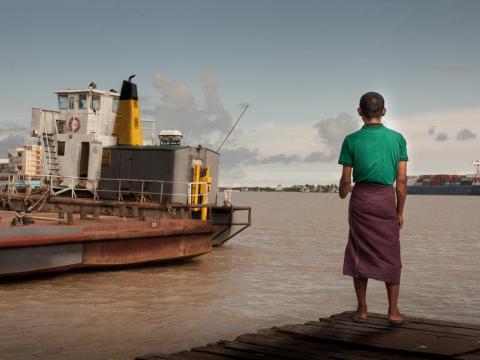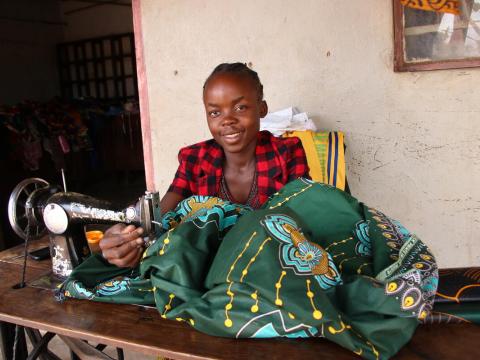
COVID makes the vulnerable more vulnerable to human trafficking
By Leen Decadt
For the past two years I have supported colleagues in Mongolia, Myanmar, Central African Republic, Senegal, DRC and Mali to combat human trafficking and the worst forms of child labour. If there is one thing I have learned, it is that these horrors do not stop during a pandemic or disaster. In fact, a crisis like COVID-19 amplifies the looming threat to people who are already vulnerable and exploited.
Take Myanmar as an example. The predominant forms of domestic and international human trafficking are forced labour and sexual exploitation. In the case of forced labour, recruitment agencies in Myanmar and other Southeast Asian countries send men to work in manufacturing, fishing, forestry, agriculture, and construction industries and women to become domestic workers and labour migrants. Those who are trafficked are lured through promises of high wages, are charged curtailment deposits for fake identity and labour permit documents, and are then trapped through debt-based coercion, passport confiscation, contract switching, wage garnishing, and threats of physical and financial harm.
In the case of sexual exploitation, most of the victims are young women who come from poor backgrounds, difficult family relationships, broken marriages, varied educational levels, and minority ethnic groups. Such girls are often enticed to China under the pretence of marriage, then subjected to sex trafficking; or they voluntarily travel to Thailand to pursue work but find themselves trapped in the sex sector or are exploited as unpaid domestic workers.
In March 2020, the first cases of COVID-19 were reported in Myanmar and the virus began to spread rapidly, causing a sharp decline in economic growth and threatening to reverse recent progress in poverty reduction. Poor and vulnerable communities were immediately affected. With enforced lockdowns, an economic downturn and the loss of income, it became harder for poorer people to have enough money for basic needs. Survivors of trafficking who had made it home had an increased chance of being trafficked again. Disruptions to education services or separation from caregivers left children unattended and at risk of traffickers. In February 2021, our concern for staff, local communities and survivors of trafficking in particular spiked when the Myanmar military took control of the country.
A study by World Vision’s Technical Services Organisation (TSO) for the Burma Anti-Trafficking in Persons Project, funded by the US Department of State, shows that COVID-19 affected the quality and accessibility of protection services and reintegration support for trafficking survivors. There is a particular impact on case management, and economic, individual and social well-being of survivors. Social workers are unable to do physical monitoring visits; there are delays in case management and it is harder to build trust between the case manager and the survivor.
The study also revealed that there is an increased risk of threats from the trafficker who takes advantage of a person’s increasingly desperate situation. Unemployment is on the rise, lockdowns limit the ability to earn an income, there is increased debt and inflation of commodity prices, and some survivors engage in sex work for their daily survival. Depression, stress and fear about COVID-19 increases survivors' mental health problems and has an impact on their inner strength and the resilience needed to face strained family relationships and stigma. Some survivors of trafficking came back during the height of the COVID pandemic, and the community, afraid they might have the virus, shunned them.
The research underlined what our staff knew: that COVID-19 has affected the ability of organisations like World Vision to provide protection services and reintegration support to survivors of trafficking without necessary adaptations. Also, that the pandemic exacerbated underlying vulnerabilities of survivors, such as health risk factors, low literacy levels, fewer or poorer job opportunities, less access to social services, threats from traffickers, risks of unsafe migration, and less family/community support.
To meet these new challenges, our staff in Myanmar responded by:
- Enabling the sustainable reintegration of survivors by providing them with food and cash assistance as a way to cope with lost income caused by lockdown and places where they could have earned money closing down;
- Advocating with service providers for equal distribution and resources to survivors in response to uneven delivery of COVID emergency support to all households by ward authorities;
- Undertaking awareness raising with family and community so they will support survivors--a particularly important issue during COVID-19, when case managers cannot visit the survivors in person; and
- Implementing a tailored livelihood programme and life skills training for survivors giving them a much higher chance of being able to earn income during and after the pandemic.
World Vision works in around 100 countries and we know that Myanmar is not the only country where such challenges are being faced. With partners, including governments, coalitions, corporates, grant donors and more, we call on everyone to do whatever they can to stop COVID-19 increasing the risk of human trafficking, child marriage, child labour, and sexual exploitation.
To learn more about World Vision’s response to the COVID-19 pandemic click here
Technical Service Organisation (TSO) is a group of technical experts within World Vision located across the partnership to support your technical sector’s development and emergency response needs. click here
Leen Decadt is World Vision’s Senior Child Protection & Child Participation Advisor. Find her bio here.
